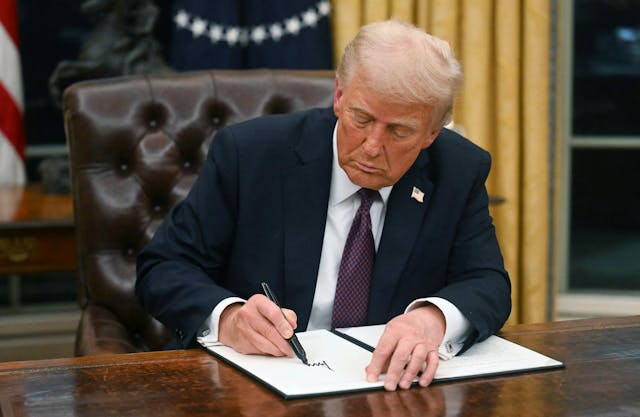Trump Slaps $100K Annual Fee on H1-B Visas
President Donald Trump signed a sweeping executive order Friday imposing a $100,000 annual fee on all H1-B visa applications, signaling a sharp escalation in his administration’s effort to prioritize American workers and crack down on corporate reliance on foreign labor.
The order applies to all current and prospective H1-B visa holders — including those seeking renewals — and requires the fee to be paid each year for six consecutive years, totaling $600,000 per worker. The move is expected to dramatically narrow the pipeline of foreign workers entering the U.S. on employment-based visas, particularly in technology and engineering sectors.
Commerce Secretary Howard Lutnick said the order reflects the administration’s core belief: “Train Americans. Stop bringing in people to take our jobs.”
“If you’re going to train somebody, you’re going to train one of the recent graduates from one of the great universities across our land,” Lutnick added. “Either the person is very valuable to the company and America, or they’re going to depart and the company is going to hire an American.”
‘Gold Card’ Visa: $1M Fast Track, $2M Corporate Sponsorship
In tandem with the H1-B overhaul, Trump also announced a second executive order launching a premium visa pathway dubbed the “Gold Card.” Under the new system, foreign workers can receive expedited visa consideration by paying a $1 million personal fee, while corporations seeking to retain top talent can sponsor applicants for $2 million.
“The Gold Card will be taking in hundreds of billions of dollars,” Trump said. “Companies will be able to keep some people that they need — people of expertise, great expertise. And we’re going to take that money and we’re going to reduce taxes, we’re going to reduce debt.”
Major Shift in U.S. Immigration Philosophy
The dual orders mark a radical shift away from the previous merit-based system that emphasized education and job offers, and toward a high-dollar, pay-to-play framework rooted in Trump’s “America First” economic platform.
White House officials say the aim is to curb abuse of the H1-B system by tech giants and multinational corporations, which often use the visas to import lower-cost foreign labor at the expense of U.S. workers.
“The current system incentivizes companies to replace Americans with cheaper foreign labor,” one senior official said. “That ends now.”
The administration is also citing national security concerns, noting that foreign dominance in key STEM fields may pose long-term risks to U.S. competitiveness and independence.
Tech Industry Braces for Turbulence
The impact on the tech sector is expected to be seismic. According to Newsweek, 60% of computer-related jobs in the U.S. are currently held by H1-B visa recipients. Industry insiders warn the $100K annual fee will price out most candidates — and companies — effectively ending the visa as a viable hiring tool.
Yet administration officials argue that this is by design.
“We are deliberately raising the bar,” Lutnick said. “We want companies to hire Americans first. If they want someone so badly from abroad, then they should be willing to pay for it — and help reduce the debt burden on American taxpayers in the process.”
With immigration, labor policy, and economic nationalism at the center of his 2025 agenda, Trump appears committed to rewriting the rules — and forcing U.S. corporations to choose between investing in American workers or paying a steep price to look elsewhere.

